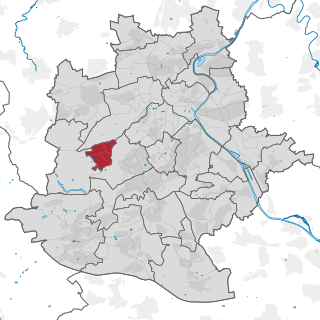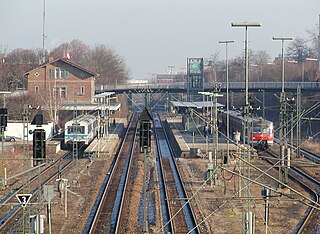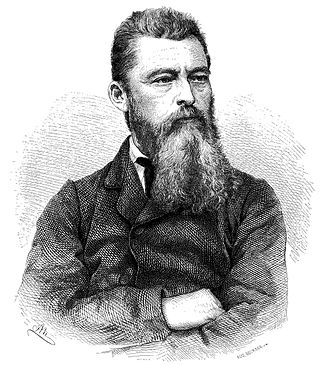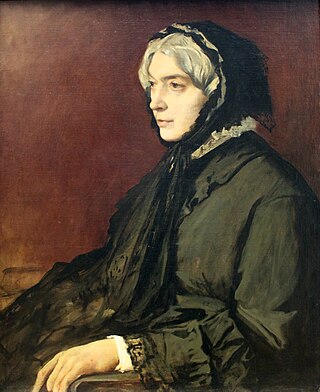Places
- Feuerbach (Kandern), a location of the Battle of Schliengen (1796)
- Feuerbach (Neckar), a river of Germany
- Stuttgart-Feuerbach, a district of the city of Stuttgart
Feuerbach may also refer to:

Paul Johann Anselm Ritter von Feuerbach was a German legal scholar. His major achievement was a reform of the Bavarian penal code which led to the abolition of torture and became a model for several other countries. He is also well-known for his work on Kaspar Hauser.

Karl Wilhelm Feuerbach was a German geometer and the son of legal scholar Paul Johann Anselm Ritter von Feuerbach, and the brother of philosopher Ludwig Feuerbach. After receiving his doctorate at age 22, he became a professor of mathematics at the Gymnasium at Erlangen. In 1822 he wrote a small book on mathematics noted mainly for a theorem on the nine-point circle, which is now known as Feuerbach's theorem. In 1827 he introduced homogeneous coordinates, independently of Möbius.

Kaspar Hauser was a German youth who claimed to have grown up in the total isolation of a darkened cell. Hauser's claims, and his subsequent death from a stab wound to his left breast, sparked much debate and controversy. Theories propounded at the time identified him as a member of the grand ducal House of Baden, hidden away because of royal intrigue. These opinions may or may not have been documented by later investigations. Other theories proposed that Hauser had been a fraud.
Anselm may refer to:

Anselm Feuerbach was a German painter. He was the leading classicist painter of the German 19th-century school.
The symposium was an Ancient Greek social institution.

Nänie is a composition for SATB chorus and orchestra, Op. 82 by Johannes Brahms, which sets to music the poem "Nänie" by Friedrich Schiller. Brahms composed the piece in 1881, in memory of his deceased friend Anselm Feuerbach. It was first performed by the Tonhalle Gesellschaft Chorus Zürich on 6 December 1881, conducted by Brahms. Nänie is a lamentation on the inevitability of death; the first sentence, "Auch das Schöne muß sterben", translates to "Even beauty must die". Typical duration of a performance is approximately 15 minutes.

Botnang is a borough of the City of Stuttgart and lies between Feuerbach, Stuttgart-West and Vaihingen.
Joseph (von) Heine was a German physician and a high civil servant in the Bavarian health service in the Rheinkreis.

Feuerbach is a borough (Stadtbezirk) of the city of Stuttgart. Its name is derived from the small river of the same name that flows from the neighboring district of Botnang through Feuerbach. Feuerbach is home to one of Germany's biggest industrial giants and is surrounded by the districts of Zuffenhausen, Bad Cannstatt, Stuttgart-North, Stuttgart-West, Botnang and Weilimdorf.

Stuttgart-Weilimdorf station is in the Stuttgart municipality of Weilimdorf in the German state of Baden-Württemberg on the Württemberg Black Forest railway and is part of the Stuttgart S-Bahn network.

Korntal station is in the town of Korntal-Münchingen in the German state of Baden-Württemberg. It is on the Württemberg Black Forest railway, which is served by the Stuttgart S-Bahn network. It is the starting point of the Strohgäu Railway, which is served by the Württembergische Eisenbahn-Gesellschaft.

Feuerbach station is an S-Bahn station in the Stuttgart borough of Feuerbach in the German state of Baden-Württemberg. It is on the Franconia Railway. The station is classified by Deutsche Bahn as a category 4 station and is classified as a haltepunkt (halt) because it now has no operable sets of points.

Stuttgart North station is a railway station in Stuttgart, Germany, serving the North area of the city. It consists of a passenger railway station on the Stuttgart S-Bahn and a goods yard.

The Stuttgart-Untertürkheim–Kornwestheim railway is an 11.5-kilometre-long freight bypass in the German state of Baden-Württemberg. The double-track electrified main line connects Untertürkheim with Kornwestheim and serves primarily as a bypass for freight around Stuttgart Central Station (Hauptbahnhof). In the Deutsche Bahn timetable as route 790.11.

Ludwig Andreas von Feuerbach was a German anthropologist and philosopher, best known for his book The Essence of Christianity, which provided a critique of Christianity that strongly influenced generations of later thinkers, including Charles Darwin, Karl Marx, Sigmund Freud, Friedrich Engels, Richard Wagner, and Friedrich Nietzsche.

Joseph Anselm Feuerbach was a German classical philologist and archaeologist.
Feuerbach is a surname. Notable people with the surname include:

Henriette Feuerbach was a German author and arts patron. She was the wife of Joseph Anselm Feuerbach and the stepmother of painter Anselm Feuerbach, whom she supported in his art.
Events from the year 1829 in Germany